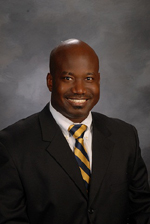2014 Digital Principals of the Year
Digital Principal award winners are honored for integrating digital media in their efforts to improve instruction, student achievement, and their own leadership.
2014 Digital Principal Award Winners

Daisy Dyer Duerr
@DaisyDyerDuerr
St. Paul High School
St. Paul, AR
When Daisy Dyer Duerr started as principal of St. Paul High School in 2011, the school had a few SmartBoards, 10 Macbooks, and not much else in terms of technology tools. From her first day, Duerr, who views technology as the great equalizer for poor and rural students, focused on improving the school’s technology. She started by putting an iPad in the hands of every teacher and later ensured the school had a Netbook cart, used throughout the disciplines for research and report writing, and a Nook cart to encourage pleasure reading for students. These efforts increased the amount of portable devices in the school from 10 to 200.
In addition, Duerr established a weekly Arkansas educational twitter chat (#ArkEdChat) and lobbied the state for more bandwidth for her school. She also ensures her students know how to use technology appropriately through a weekly Digital Citizenship advisory. Just as Duerr uses technology to improve instruction for her students, she takes advantage of the extra professional development opportunities it offers as well. “Even though I am a principal in a rural locale, I am able to learn globally, thanks to technology.”
Jason Markey
@JasonMMarkey
East Leyden High School
Franklin Park, IL

Jason Markey’s view on technology in schools starts with the belief that students shouldn’t have to “disconnect” at school. “We should be infusing technology seamlessly throughout their educational experience to both enhance and provide the needed guidance to navigate the new digital waters we are all in,” Markey says. Markey sees technology as a way to continually provide students new opportunities that lead them to be innovative thinkers. He encourages his students to use collaborative blogs and social media sites to give themselves a voice in the school. Markey helped design a technology support internship class which serves a model student led help desk to support the 3,500 student devices in the district. In the past year, students have served nearly 95 percent of the tech help desk tickets, amounting to more than 10,000 requests for help.
In addition, Jason organized a Digital Citizenship Leadership team that works on acceptable use guidelines and providing information for students and parents about the positive and negative impacts social media can have on them. In the last two years, Markey has presented more than 40 times on technology in education, was selected to the Google Teacher Academy, and helped create a 1:1 Summer Symposium to help other schools build a vision for technology in education.

Derek McCoy
@mccoyderek
Spring Lake Middle School
Spring Lake, NC
Derek McCoy’s years as a principal and teacher in Title 1 schools has shown him that using digital technology to prepare students for the future and change the way schools are managed has been the bridge to narrowing the achievement gap. While principal at Spring Lake Middle School, McCoy has implemented a BYOD framework, made significant increases in technology resources, and moved all the school’s planning documents to the district’s Google cloud.
In addition, McCoy co-moderates two active chats on Twitter. #Edfocus works to connect authors and experts with educators to help make changes in classrooms and schools at large, while #ncadmin is the only chat in North Carolina designed to help leaders in the state learn best practices and about new endeavors. Social media and the philosophy of getting connected have had the biggest impact on his district and his personal growth as a principal, McCoy says. “Most of the resources and strategies I bring to my school are from friends I’ve never met face to face,” McCoy says. “That is the power of being a digital leader, the power of a PLN and the power of being connected.”
